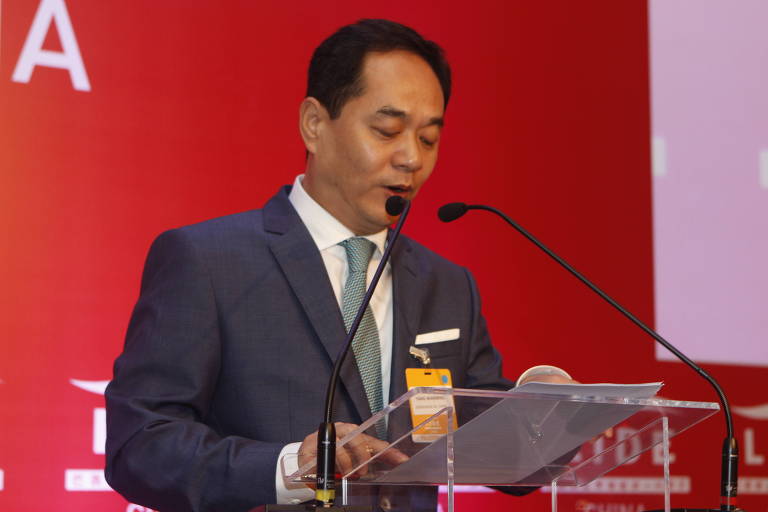RIO DE JANEIRO, BRAZIL – Prompted by Foreign Minister Ernesto Araújo, last year President Jair Bolsonaro called on the Chinese regime to replace its ambassador to Brazil, Yang Wanming.

The decision was made in April and reiterated in November, after social media clashes between the diplomat and deputy Eduardo Bolsonaro. Beijing ignored the Brazilian request both times.
The trigger that prompted the request was the Twitter clash between Eduardo and the Chinese diplomat. In March 2020, the deputy published a text comparing the Covid-19 pandemic to the Chernobyl nuclear accident (1986) in the former Soviet Union, and claiming that the Chinese regime bore responsibility for the spread of the disease.
“Replace the nuclear power plant with the coronavirus and the Soviet dictatorship with the Chinese. Once again a dictatorship preferred to conceal something serious rather than expose something that would save countless lives,” the deputy wrote at the time.
Yang labeled Eduardo’s comments as an “evil insult”, and the embassy’s official profile published a post accusing the deputy of having contracted a “mental virus”.
The clash made the Brazilian government take a drastic decision, which caused apprehension among diplomats at the Foreign Ministry.
In late March, Ernesto sent Brazil’s ambassador in Beijing, Paulo Estivallet de Mesquita, a diplomatic telegram asking him to deliver a formal document to the Chinese government requesting Yang’s replacement – which occurred in early April, according to anonymous sources involved in the discussions.
The request was ignored.
The Ministry of Foreign Affairs declined to comment on the matter.
In November, at the height of the attacks on Chinese telecommunications giant Huawei, Eduardo accused China of promoting industrial espionage through 5G equipment.
Yang reacted, and the Foreign Ministry again requested the replacement.
The formal requests for Yang’s replacement were secret, but a letter sent by Ernesto Araújo to the Chinese embassy in Brasília conveyed the Bolsonaro government’s displeasure with the Chinese diplomat.
“It is inappropriate for diplomatic officials of the People’s Republic of China in Brazil to deal with the affairs of the Brazil-China relationship through social networks. Diplomatic channels are open and should be used,” stated the Foreign Ministry in the letter, forwarded in November.
Officially, there have been no replies on Yang’s exchange requests. However, Beijing has notified Brazilian authorities that its ambassador to Brazil is a highly regarded member of the Chinese public service.
A member of the Bolsonaro government argues that Yang’s statements were endorsed by the Beijing authorities, who have instructed their diplomats abroad to react to statements considered offensive to the regime.
Araújo’s relations with Yang have been severed. The Foreign Ministry’s Asia-Pacific division is also closed to him, according to people close to the ambassador.
The Brazilian government’s request to replace the Chinese ambassador is completely out of line with diplomatic procedure.
Governments have the prerogative to expel foreign diplomats from their countries, but this gesture is considered extreme and with the potential to undermine bilateral relations.
If Bolsonaro had chosen this measure, the inevitable reaction would have been the expulsion of Brazil’s ambassador to Beijing, thereby aggravating the diplomatic crisis with Brazil’s largest trading partner.
According to these sources, Araújo chose a “lighter” measure with a “marketing” effect, particularly taking into account the Bolsonaro family’s interests.
A diplomat with experience in Brazil-China relations says that the Bolsonaro government should have known that Beijing would not attend the request. Were it to give in to Brazil, China could see similar requests coming from other countries where Chinese ambassadors have been controversial.
In Sweden, for instance, the Chinese ambassador made remarks that caused uneasiness among the local authorities.
Araújo’s discomfort – ignored by Beijing – became clearer when president Bolsonaro was forced to approach China regarding the release of raw materials for the production of the coronavirus vaccine.
Up to the last moment, the Planalto Palace tried to secure the import of ready-made immunizers from Oxford/AstraZeneca, manufactured in a laboratory in India.
However, before negotiations failed with India, it suffered a political blow dealt by governor João Doria (PSDB-SP), who negotiated directly with a laboratory in China to buy the Coronavac.
The first picture of immunization in the country was Doria’s.
To make matters worse for the federal government, which had already been criticized for its delay in starting vaccinating, both the Butantan Institute and the Fiocruz (Oswaldo Cruz Foundation) had their shipments of raw materials for the production of immunizers delayed.
The raw materials for both the Oxford/AstraZeneca and Coronavac vaccines are produced in China.
Bolsonaro appealed to China and even requested a telephone call with the country’s leader, Xi Jinping.
Faced with these obstacles, Bolsonaro asked during a live stream that Araújo restore relations with the Asian giant. The Foreign Minister replied that the Brazilian ambassador to Beijing was in direct talks with the Chinese government.
But behind the scenes, the Minister maintained the “closed doors” policy with Yang.
Moreover, Araújo did not abandon the anti-China rhetoric that marked his administration, and recently ordered subordinates to compile critical statements made by foreign officials against the Chinese regime.
In one of the requests, Araújo asks members of the diplomatic staff to send him statements against Beijing by the Australian and Japanese authorities.
To circumvent the Foreign Ministry’s failure to dialogue with the Chinese embassy, the president accepted the suggestions of ministers who formed a kind of “triple alliance” in an attempt to save Brazil’s relationship with its main trading partner. Ministers Eduardo Pazuello (Health), Tereza Cristina (Agriculture) and Fábio Faria (Communications) are part of the efforts.
Vice-president General Hamilton Mourão, who chairs the Sino-Brazilian High Level Commission for Coordination and Cooperation (COSBAN), was not invited. He is experiencing the worst moment in his relationship with Bolsonaro, who has stopped delegating government tasks to his vice-president.
Source: Folha de São Paulo

